'Life for our community is a living hell after court ruling'
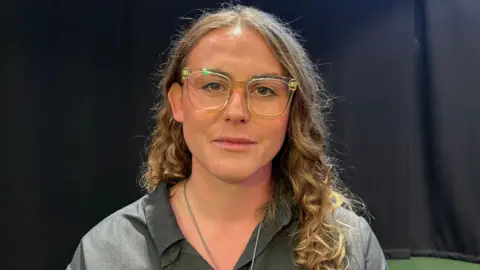 Ben Schofield/BBC
Ben Schofield/BBCIt's been a month since the UK Supreme Court ruled that under the Equality Act, "woman" means a biological woman. The decision was welcomed by some women's rights groups but condemned in the transgender community. How are they and others affected by the ruling feeling now?
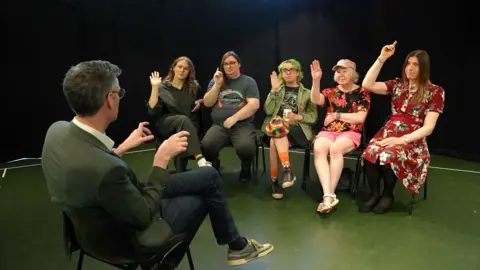 Richard Knights/BBC
Richard Knights/BBCWhile the full implications of the ruling are not yet clear, some members of the trans community feel threatened by it.
There is confusion and fear over how it might affect their legal rights and access to facilities, along with concern that it may have emboldened those in society with transphobic views.
In Ipswich, Suffolk Pride has brought together five trans and non-binary members.
How many of them feel less safe since the ruling?
All five – in an unscientific poll – raise their hands.
Kate Lankester, a 25-year-old trans woman who works in trans healthcare, says life is "a living hell".
"I'm walking out of the house scared every single day," she says.
"I worry about who's looking. I worry if someone's going to say something to me."
She says fear of transphobia is "impacting our community's wellbeing, mental health, how we're viewing society and how society views us".
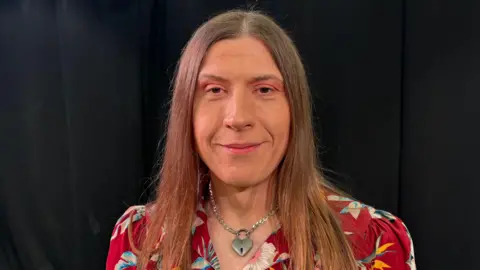 Ben Schofield/BBC
Ben Schofield/BBCTwo of the five say they have experienced more transphobia since last month's ruling.
Jessica Brown, 45, has been "out" for about 20 years and says she has recently noticed a "huge uptick" in transphobia.
She says she was physically assaulted earlier this year - before the ruling - and now experiences abuse "almost daily".
"I've had the most vile things shouted at me; people are so abusive," she says.
"I think, 'Oh God, what's going to happen today? Is it going to be another physical assault? Is it just going to be verbal assaults?'
"I go home and I cry."
While she says "most people are fine", the abuse comes from a "very small minority that are very vocal, very loud".
What was the Supreme Court case about?
On 15 April the UK's most senior judges ruled that a woman was defined by biological sex under equalities law.
- The ruling followed a long legal battle between For Women Scotland (FWS) and the Scottish government
- Campaigners in FWS argued that sex-based legal protections should only apply to people born female
- But the Scottish government said transgender people with a gender recognition certificate were entitled to the same sex-based protections as biological women
- Senior judges were asked to interpret the proper meaning of the 2010 Equality Act, which applies across the UK
- They unanimously agreed that "woman" and "sex" in the act referred to "a biological woman and biological sex"
- But Judge Lord Hodge said: "We counsel against reading this judgement as a triumph of one or more groups in our society at the expense of another; it is not."
- The judges added that equalities legislation still gave transgender people protection against discrimination "through the protected characteristic of gender reassignment"
Read more: Five key takeaways from Supreme Court ruling
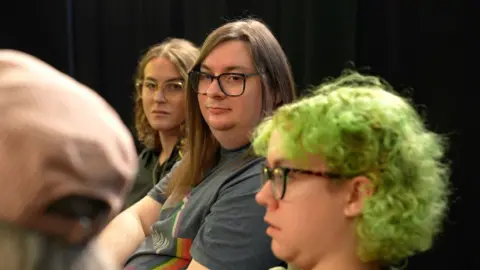 Richard Knights/BBC
Richard Knights/BBCAll five in the Ipswich group say they are more anxious about the future following the court's decision.
Benji Rayson, a 35-year-old bingo caller who identifies as non-binary, says they do not believe the ruling will "fix anything" but has instead "shone a light on a community that just wants to get on and do their own thing".
"This is a scary time for everyone," Benji adds, "because this is a ruling that's been brought in with the intent of bringing clarity, but it's vague enough that people can read into it what they want and that means that people are empowered to bring their prejudices."
They are calling for a "much wider conversation around fixing the problem of protecting women as a whole", rather than blaming the transgender community, which comprise "less than 1% of the population".
According to the 2021 Census, 0.54% of the UK population - 262,000 people - identified as trans.
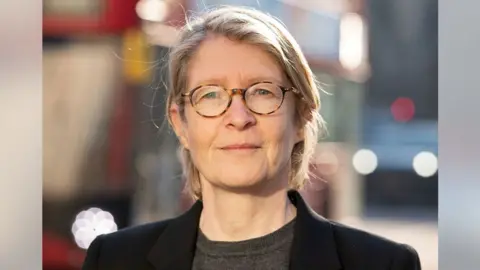 LGB Alliance
LGB AllianceBut for Kate Barker, chief executive of LGB Alliance, the ruling brought welcome clarity.
Her organisation was part of the case and argued biological sex was more important than gender.
"It's not an objection to anyone being trans. It's an objection to male people in women's spaces," she says.
"And that means all men. You can't let in a certain type of man. You can't let in men who are nice, or men that you know, or men who sincerely believe they are women, and not other men.
"It is binary."
Ms Barker says she "regretted" that trans people feel scared, calling for "calm" and saying she hopes the ruling will lead to improved services for them.
"I think it should be a kick to the lobby groups and to the government to really think about what services do trans people need in order to have dignified, respectful ways to go about their business and to exist fully in society."
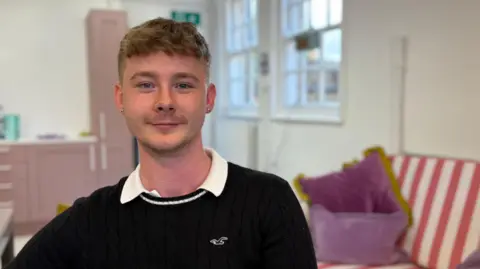 Ben Schofield/BBC
Ben Schofield/BBCAt LGBTQ+ charity Q:alliance in Milton Keynes, the organisation's communications manager Jay Virgo, 30, believes some people now think they have "a sense of empowerment that it's OK to behave in a certain way".
"Nowhere in this ruling does it say that you are suddenly allowed to be homophobic or transphobic, but people have taken it that way," he says.
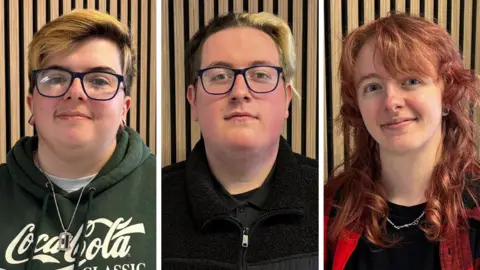 Ben Schofield/BBC
Ben Schofield/BBCAmong those supported by Q:alliance, transphobic abuse is not the only source of fear.
Cammy Findleton, a 25-year-old trans woman, says she is worried about accessing healthcare and "dreading what's going to happen next".
Kye Tilley, 26, who identifies as transmasculine, feels it is "important" to "stand up" to the ruling.
"It made me feel scared about my future; about other people's futures."
And Sam Dowling, 25, who identifies as non-binary, says: "I don't think people realise that even when rights get taken away, we're not going to cease to exist; we're still going to be here, and there's going to be even more hate crime because of it."
Follow Beds, Herts and Bucks news on BBC Sounds, Facebook, Instagram and X.
